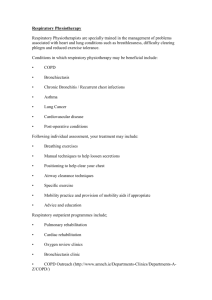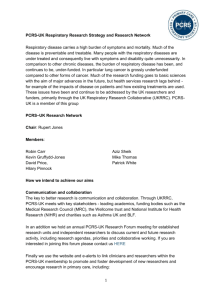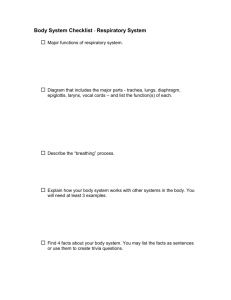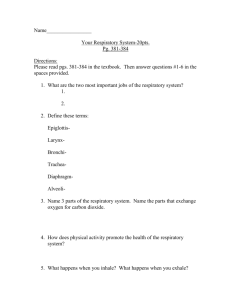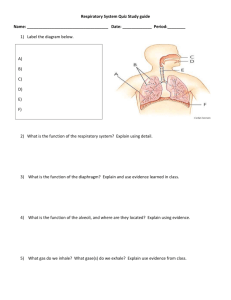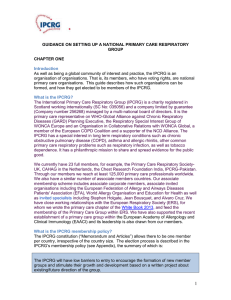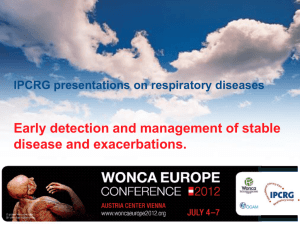International Primary Care Respiratory Group
advertisement
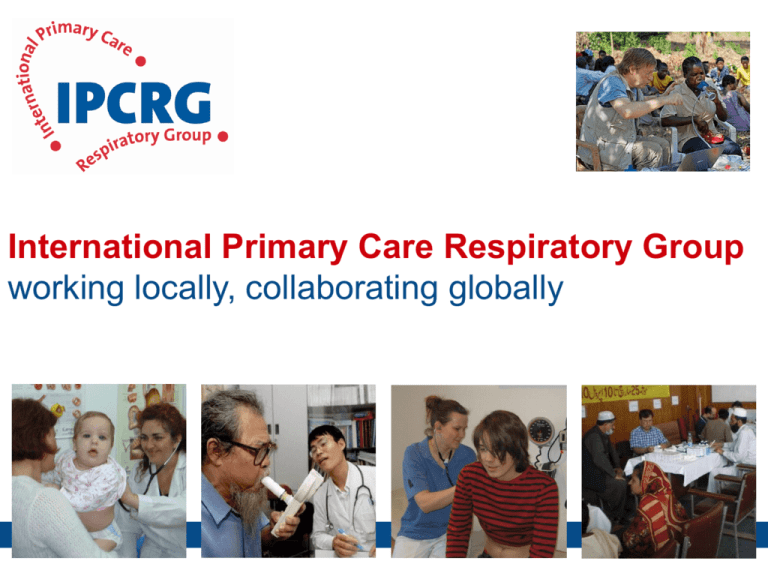
International Primary Care Respiratory Group working locally, collaborating globally The only • International primary care respiratory organisation • International primary care organisation with a respiratory research mission • Primary care respiratory journal with an IMPACT factor (2.19 for 2012) Organisation of organisations reaching 118,000+ global GPs 22 country member organisations 28 associate country members 6 associate corporate members Alliances: EAACI European COPD Coalition GAAPP WONCA EPOS EAACI primary care group ERS primary care group + associate member organisations: Associate Corporate Members: European Federation of Allergy & Airways Boehringer Ingelheim Diseases Patients’ Associations Mundipharma Novartis Education for Health Pfizer European Forum for Primary Care Teva International COPD Coalition Vitalograph World Allergy Organization The Board 2013 President and WHO-GARD Planning Executive (primary care) Niels Chavannes, Netherlands Low and middle income countries, Tan Tze Lee, Singapore joins June 2013 President Elect, Ron Tomlins, Australia Treasurer, CEO National Asthma Council Australia, Kristine Whorlow, Australia Immediate Past President, WONCA Europe Doctor of the Year 2012 Miguel Roman, Spain Co-optee and Co-optee and PCRJ Education Chair 2014 Rep, Jaime Organising Correia de Committee Ioanna Tsiligianni, Sousa, Portugal Crete Conference Advisor and Past President Anders Ostrem, Norway Co-optee, Karin Lisspers, Sweden, joins June 2013 WHO-GARD • • • Primary care reps on Planning Executive Demonstration projects in Vietnam, Bangladesh and Uganda All national action plans should involve primary care Raising respiratory standards • WONCA Europe 2010, 2011, 2012 and 2013 • • • Workshop programmes Miguel Roman: Doctor of the Year Primary care chapter of ERS White Book 2013 Delivering value for respiratory research by working locally, collaborating globally © IPCRG2013 2007 Research is the reason the IPCRG exists • IPCRG’s charitable mission is “to improve public health by carrying out, funding and organising research into the care, treatment and prevention of respiratory illnesses, diseases and problems in a community setting, and to make available the results of such research for the benefit of the public and healthcare professionals.” There is a need for research: • • • • Undertaken within primary care Recruiting populations representative of primary care patients Evaluating interventions realistically delivered within primary care Drawing conclusions meaningful to professionals working within primary care What’s the problem we need to sort? Global Action Plan against NCDs • • • 25% reduction in mortality from NCDs by 2025 30% reduction in tobacco use Learning shared between low, middle and high income countries Increasing capability + capacity E-Faculty Equip one primary care research- • E-Faculty o Vietnam aspiring country with the skills to conduct high quality original research .....[in the field of] chronic respiratory disease and appropriate respiratory management o Romania o Chile • FRESH AIR o Vietnam o Uganda o ? Eritrea, Kyrgyzstan Fresh Air project •Identifying COPD •Smoking •Biomass fuels Tanzania Educational products • • 974 participants plus • • • • • • • 45 countries 180 webcast audience: Chile (2 venues), Argentina, India and Spain 22 aided by IPCRG bursary 15 from Bangladesh 63 from Russia 112 AHPs 20 doctors in training 18 hours CME accreditation Research meetings + conferences 150 primary care delegates: innovators and early adopters Meet Thursday night: FRESH AIR Uganda Friday: themed abstracts Saturday: research design day (3 projects selected from 10 bids) Research meetings + conferences A Breath of Fresh Air: Multiple Morbidities and Integration What changes clinical behaviour: E-Quality Bids for small scale educational interventions to improve respiratory diagnosis treatment and care • Adelaide, Australia – transposition of Spirometry 360 – distance learning programme with over-reading and mentoring service initiated by University of Washington What changes clinical behaviour: E-Quality • Dr Beraki Ghezai + colleagues Norway/ Eritrea • Prior to 2003 establishment School of Medicine, physician index 5 per 100,000 First graduating class in 2009 had 44 physicians • Develop capacity for diagnosing chronic respiratory disease across Eritrea: o Educational programme for 6x regional hospital leads o Pilot an educational programme for healthcare workers in one region • Introduce use of diagnostic tools Associate member. • Person or group of people. o Not formal group (Membership rules and list, bank account) o Represent primary care in the country? • Will allow you to particpate in IPCRG, but not full voting rights. Lunger i praksis. • Norwegian network of GPs with special interest in pulmonary medicine. • Formed in 2000 – founding member of IPCRG. • 450 members (10% of all GPs) Aims of Lunger i praksis. • • Improve care for people with pulmonary disease in primary care. • Inspire to research on pulmonary diseases outside the hospital setting. • Create a meeting-place for GPs with an interest in pulmonary medicine. • • Organise courses and conferences for primary care. Increase the knowledge of GPs and health personnel working in primary care. Increase primary care influence in national guidelines Our activities: • Courses: o CME courses for GPs and health care personnel since 2000. • Research: o Several researchers affiliated to the University of Oslo. • Projects: o Guidelines for COPD; asthma and smoking cessation o International activates; e-Quality , IPCRG conferences. Eritrea; e-quality....and more? • Lunger i praksis is committed to work over time to develop projects in Eritrea in collaboration with the Orotta school of Medicine and Dentistry. o Educational projects o Research projects – “Fresh Air Eritrea” o Support development of research capacity o ...and more! To conclude, IPCRG is • • Independent • • Aligned to primary care (WONCA Europe and global) • Supported by patients (ELF, EFA, GAAPP, COPD Coalition) • Communities of practice: research, education, care delivery • Because primary care, can tackle multiple morbidities Work in low, middle and high income countries (aligned to NCD Alliance, Union) Aligned to respiratory care (ERS, GARD, EAACI, ARIA, WAO)
